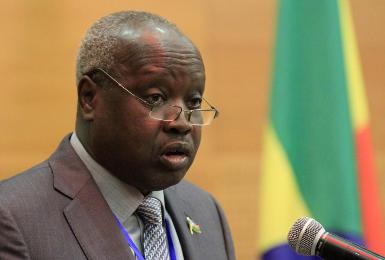S. Sudan peace talks delayed over unmet rebel demands
By Tesfa-Alem Tekle
February 18, 2014 (ADDIS ABABA) – The second round of peace talks between South Sudan’s warring parties failed to resume in Ethiopia, over president Salva Kiir’s failure to meet demands of rebels, an official of the SPLM-inOpposition told Sudan Tribune on Tuesday.

“The talks were delayed because our position on the withdrawal of Ugandan forces and release of the remaining four detainees have not been fulfilled” said Puoch Riek Deng, a public relations officer for the humanitarian liaison office of the rebel delegation in Ethiopia said.
After a fragile ceasefire deal signed in Addis Ababa on 23 January between the South Sudanese government and the SPLM-in-Opposition rebels, Juba freed seven out of the 11 former senior officials on January 29.
The 11 members of South Sudan’s ruling SPLM were detained in the wake of fighting in the capital Juba between members of army, which was the government claim was an alleged coup attempt by disaffected senior politicians, many of whom were sacked by President Salva Kiir in 2014.
The four remaining detainees include, who include Pagan Amum the former SPLM secretary general, are facing charges of treason and staging coup, as is South Sudan’s former vice president Riek Machar who is now leading the SPLM-in-Opposition a loose coalition of defected soldiers, armed civilians and some senior SPLM politicians who oppose Kiir’s leadership.
The rebel official in the Ethiopian capital however said his negotiating team is not boycotting the IGAD mediated talks but they are demanding agreements reached during the first round of negotiations are expedited.
He said the success of the next round of talks depends on the implementation of the previously reached agreements.
The previous ceasefire deal agreement did not bring an end to fighting on the ground and the two sides have continue to accusations over violations of the truce agreement.
“The government continues to violate the cessation of hostilities by attacking our areas” Puoch said adding “We don’t see serious commitment by the government to seek peaceful solution to the conflict”.
South Sudanese rebels on Tuesday said they had taken control Malakal, the state capital if Upper Nile a major oil producing area. The government however said the town still remains under its control but the fighting for control of Malakal is the biggest clash since the ceasefire deal.
An estimated 10,000 people have died in the two-month conflict which displaced over 700,000 people within South Sudan and forced almost 150,000 people to flee to nearby countries.
Government representatives in Ethiopia told Sudan Tribune that the assault carried out by rebels was a clear indication of their continued violation of the ceasefire and lack of commitment for political dialogue.
The rebels, however, accuse the South Sudanese army (SPLA) of instigating the latest clashes.
“The government is the one who attacked our positions first, so on self defense we ended up over running their forces” Bor Gatwech, a South Sudanese MP who is now the humanitarian liaison officer for the SPLM/A-in-Opposition, told Sudan Tribune.
IGAD mediators are holding discussions with the two parties to keep the fresh round of talks moving.
Sudan Tribune understands that the agenda for the peace talks is still being drafted. It is feared that the latest clashes may severely hinder the planned peace talks on political, national reconciliation and on identifying the root causes of the conflict.
(ST)
